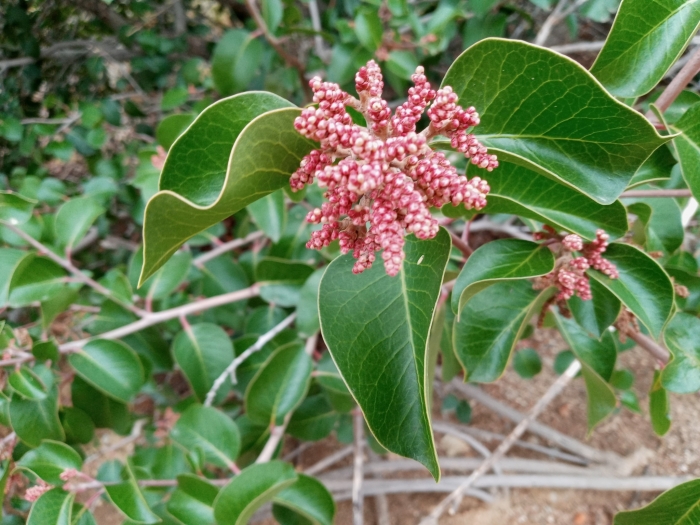Sugar Bush
(Rhus ovata)
Sugar Bush (Rhus ovata)
/
/

Daniel S.
CC BY 4.0
Image By:
Daniel S.
Recorded By:
Copyright:
CC BY 4.0
Copyright Notice:
Photo by: Daniel S. | License Type: CC BY 4.0 | License URL: http://creativecommons.org/licenses/by/4.0/ | Rights Holder: Daniel S. | Publisher: iNaturalist | Date Created: 2021-01-31T14:48:22-08:00 |




















































Estimated Native Range
Summary
Rhus ovata, commonly known as Sugar Bush or Sugar Sumac, is an evergreen shrub or small tree native to the chaparral and associated ecosystems, including coastal sage scrub and oak woodlands, in Southern California, Arizona, and the Baja California peninsula. It can live up to 100 years and typically grows to a height of 8-15 feet (2.4-4.5 meters) with a similar spread. Rhus ovata has dense, dark green, leathery leaves that contribute to its conspicuous appearance in its native habitat. The plant produces clusters of small, white to pale pink flowers from late winter to early spring, which are followed by red, sticky fruits that are attractive to birds and other wildlife.
Sugar Bush is valued for its dense evergreen foliage and its ability to thrive in arid conditions, making it an excellent choice for water-wise gardens and natural landscaping. It is also used for erosion control on slopes and in fire-prone areas due to its fire-resistant properties. In cultivation, it requires minimal care once established, tolerating full sun to part shade and preferring well-drained soils. While it is drought-tolerant, occasional deep watering during extended dry periods can promote healthier growth. Sugar Bush does not tolerate heavy pruning well, but it can be cut back to the base crown if necessary for rejuvenation or wildfire fuel reduction.CC BY-SA 4.0
Sugar Bush is valued for its dense evergreen foliage and its ability to thrive in arid conditions, making it an excellent choice for water-wise gardens and natural landscaping. It is also used for erosion control on slopes and in fire-prone areas due to its fire-resistant properties. In cultivation, it requires minimal care once established, tolerating full sun to part shade and preferring well-drained soils. While it is drought-tolerant, occasional deep watering during extended dry periods can promote healthier growth. Sugar Bush does not tolerate heavy pruning well, but it can be cut back to the base crown if necessary for rejuvenation or wildfire fuel reduction.CC BY-SA 4.0
Plant Description
- Plant Type: Shrubs
- Height: 3-10 feet
- Width: 3-6 feet
- Growth Rate: Moderate
- Flower Color: N/A
- Flowering Season: Spring
- Leaf Retention: Evergreen
Growth Requirements
- Sun: Full Sun, Part Shade
- Water: Low
- Drainage: Fast, Medium
Common Uses
Bee Garden, Bird Garden, Butterfly Garden, Deer Resistant, Drought Tolerant, Edible*Disclaimer: Easyscape's listed plant edibility is for informational use. Always verify the safety and proper identification of any plant before consumption., Erosion Control, Fire Resistant, Fragrant, Hedges, Hummingbird Garden, Low Maintenance, Rabbit Resistant, Street Planting
Natural Habitat
Chaparral, coastal sage scrub, and oak woodlands in Southern California, Arizona, and the Baja California peninsula
Other Names
Common Names: Sugar Bush
Scientific Names: Rhus ovata , Schmaltzia ovata , Neostyphonia ovata , Rhus ovata var. traskiae , Schmaltzia ovata var. traskiae
GBIF Accepted Name: Rhus ovata S.Watson